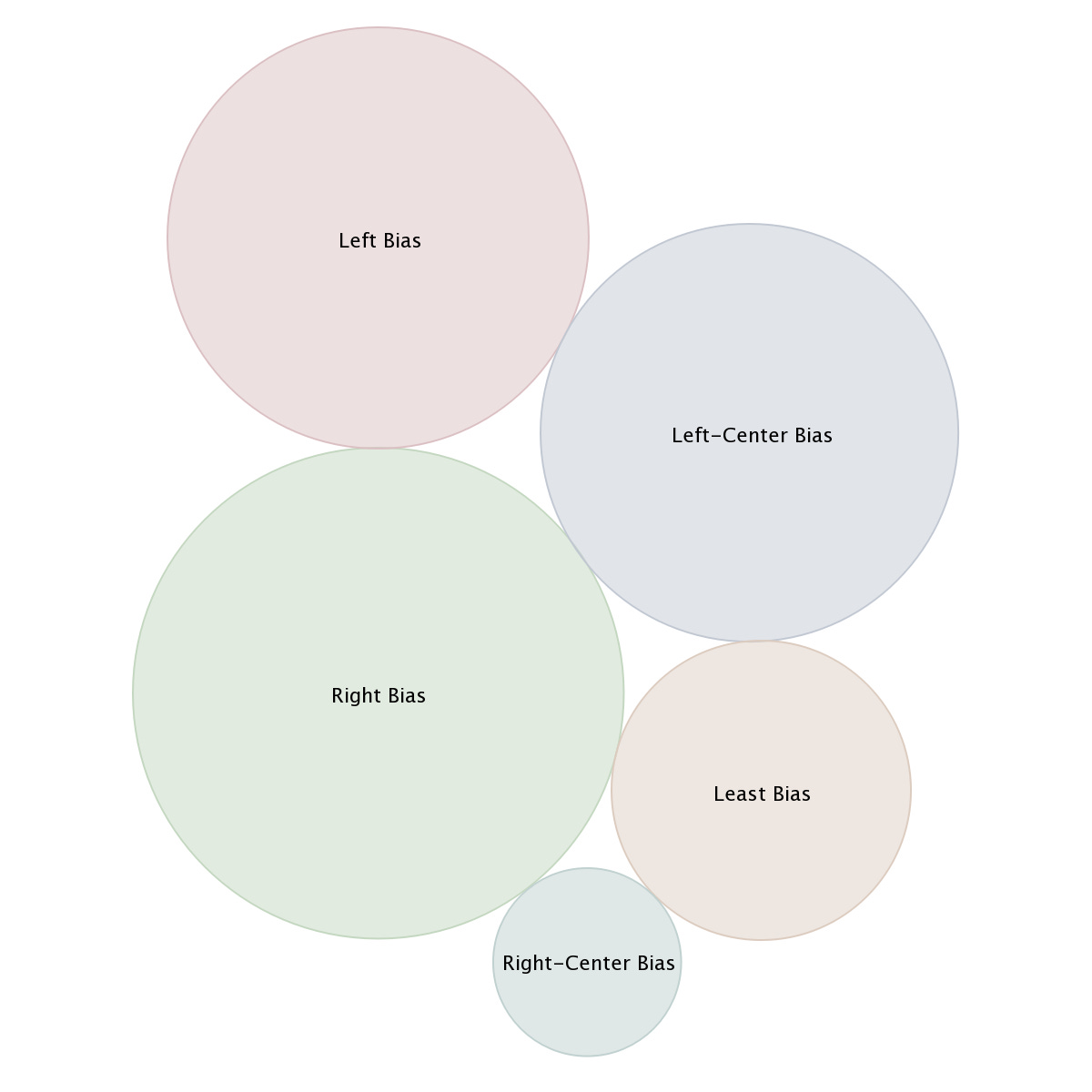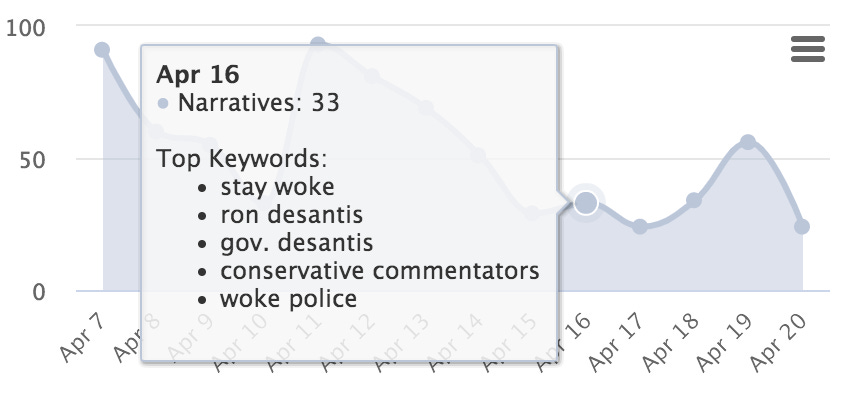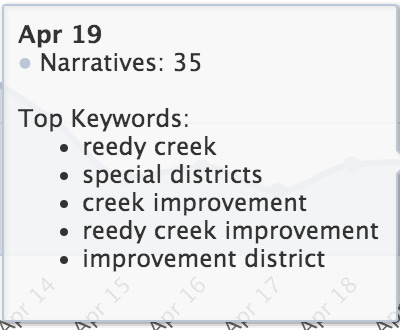Menu

Disney has been in the media's spotlight, not for its' entertainment offerings, but for its recent opposition to Florida’s controversial bill regarding sexuality in children’s education. The entertainment giant’s stance has not gone unnoticed. EdgeTheory narrative intelligence identified 763 unique narratives from 204 different sources in U.S. Media surrounding Disney’s response to the Florida legislation. These sources were split between left and right-leaning biases. Taking a closer look at these sources reveals who, and what, is driving the narrative surrounding Disney’s latest political stand.

On March 28th, Governor Ron DeSantis signed HB 1557, the Parental Rights in Education Bill, into law. The bill provides guidelines around teaching sexuality in schools, most notably prohibiting classroom instruction on sexual orientation or gender identity in kindergarten through 3rd grade. For this reason, opponents have nicknamed HB 1557 the “Don’t Say Gay” bill. While the bill has received both criticism and praise, no response has garnered as much attention as that of Disney. Just hours after the bill was signed into law, Disney released an official statement condemning the legislation. As Disney and Governor DeSantis continue to clash over the issue, several narrative trends have emerged.
One insight that this Kudzu brief reveals is that the media’s attention has gone straight to the top of the chain of command. For example, the CEO of The Walt Disney Company, Bob Chapek. In the last two weeks alone, 229 unique U.S. media sources have mentioned Bob Chapek. Chapek has been constantly pushed to make political statements ever since he took the helm of Disney in 2020. Despite this, the Disney CEO’s rep has stated that he “does not bring any partisan agenda to work.” While this seemed to be the case initially, Chapek has since changed his approach to politics.
After weeks of a neutral stance, Chapek eventually broke the silence and came out against the bill, admitting that his initial stance “didn’t quite get the job done.” From his initial reluctance to engage the legislation to his eventual condemnation, Chapek has taken heat from both sides for his handling of the bill. EdgeTheory’s narrative intelligence report shows just how much Chapek’s handling of the situation has thrown him into the spotlight.

Unsurprisingly, another focal point of this narrative is Governor Ron DeSantis. DeSantis is very outspoken about the bill and has not backed down from the legislation. The governor has defended this bill by saying in an official statement that children “should be protected from schools using classroom instruction to sexualize their kids as young as 5 years old.”
The response to the bill has been mixed, to say the least. The narrative ranges from Breitbart citing a poll that the nation has a favorable view of the Florida governor to CNN criticizing DeSantis’ declaration of a “culture war”. While opinions on DeSantis are varied, the amount of media coverage is not. In the last 14 days, Ron DeSantis was mentioned as a top keyword in all but 4 days. As DeSantis takes Disney head-on, there is no doubt that his actions are driving the narrative.
Additionally, the narrative shows that a leadership position is not required to help shape the conversation. Another prominent name among sources running stories about Disney is Charlee Disney. Charlee Disney’s name was mentioned by 132 different sources in U.S. Media. Just last week, Disney Heir Charlee Disney came out as transgender and condemned the bill set forth by the Florida legislature. Though Charlee works as a high school biology teacher and does not typically speak much about the Disney family, it is clear that the Disney name carries a lot of weight. Charlee has become one of the biggest opponents of the bill and a figure that the LGBTQ community is standing behind to voice its opposition.
Drawing from sources in U.S. Media also helps us understand the organizations involved in the narrative. One organization with significant media mentions is the Human Rights Campaign. The Human Rights Campaign was one of the biggest organizations to put pressure on Disney before its official statement condemning the bill. The Organization even refused donations until Disney proved to “build on their public commitment” by ensuring that “dangerous proposals” don’t become “dangerous laws.” The Human Rights Campaign took the spotlight and became yet another strong voice that would eventually push Disney to take a stronger stand on the legislation.
Finally, narrative intelligence allows us to not only understand who is involved, it allows us to track what actions are being taken. For example, here are top keywords surrounding the narrative on April 19th:

What is Reedy Creek? According to Reedy Creek’s website, it is a “progressive form of government, created in 1967 by a special Act of the Florida Legislature, the purpose of which is to support and administer certain aspects of the economic development and tourism within District boundaries.” Essentially, the district allows Disney to self-govern and regulate most aspects similar to a normal county. In regards to the Disney narrative, Reedy creek is DeSantis’ latest political weapon. On the matter, DeSantis stated, “I don’t support special privileges in law just because a company is powerful, and they’ve been able to wield a lot of power.” The Florida legislature swiftly passed a bill to dissolve Reedy Creek’s special district and is currently waiting on DeSantis to sign.
Business Insider explains the implications, saying that Reedy Creek “would have to deal with a lot more government bureaucracy and pay a lot more in fees and taxes.” The media points to exactly how DeSantis is using a Republican-controlled legislature to fight back against Disney.
As the conflict wages on, Disney has shown itself to be a major player in shaping the public discourse of HB 1557. This intervention will continue as Ron DeSantis uses political means of winning his feud with Disney and is likely to sign the bill to dissolve Disney’s special district. Narrative intelligence from EdgeTheory provides valuable insight into the main players in this massive public discourse, and this brief from US media will automatically update as the narrative continues take shape.